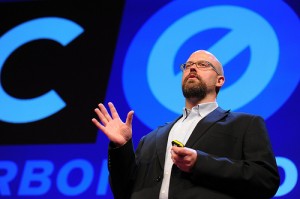Imagining Sustainability and a Green City with Alex Steffen
For millennia, the human race has been building upon the face of the Earth, carving out more and more environments in which to live, chiseling away the mountains and chopping down the forests to build cities, using technology not to sustain our lives but to improve them—to make our lives more comfortable and convenient. The Earth has been nothing more than the ground beneath our feet and the foundation for our building, sustaining us while we abuse it.
But then, each April, comes Earth Day, a yearly opportunity to slow down for just a moment, take a deep breath and reassess our relationship with the giant rock floating in space that we call home. With the announcement of the City 2.0 as this year’s TED Prize, the TED community has been presented with a unique opportunity to closely examine the largest of human environments—the city—and to develop sustainable measures to stop the city from being no more than blight on the face of the Earth. Instead, we have been drafted to create a true partnership between the Earth and the man-made environments we live in; to be the stewards of the Earth we were always intended to be.
With this goal in mind, it is worth revisiting Worldchanging.org founder Alex Steffen’s TED Talk from 2005 in which he gazes into the future—today, in essence—and sees a vast potential for sustainability and tools as beautiful as the planet they are meant to fix.
But first, Steffen provides a very brief history of Earth and the human race.
“Picture a little Earth, circling around the sun,” he said. “You know, about a million years ago, a bunch of monkeys fell out of trees, got a little clever, harnessed fire, invented the printing press, made, you know, luggage with wheels on it. And, you know, built the society that we now live in.”
Sadly, all that luggage we’ve made has contributed to an entirely unsustainable ecological footprint, Steffen said. At the rate we are burning through our natural resources, it would require five planets to sustain us. And that’s mostly due to Western culture. If everyone on the planet behaved the way we in the West do, it would take as many as 10 planets. Of course, we only have one Earth. With more and more developing nations learning from our example, something’s got to give.
Steffen, anticipating the City 2.0 idea in 2005, says cities are the best tool we have for fixing how we live on this planet. With so many of us living in cities, especially in the developed world, a small change can have a very large impact.
So what can we do? To start with, Steffen says, we must build denser cities. Defining the borders of a city permanently and then growing the city up instead of out allows for the development of truly effective transit systems, reduces the need for cars and provides a commute that is reasonably comfortable.
Vancouver, he says, is doing density better than any other city on the planet.
“They’re actually managing to talk North Americans out of driving cars, which is a pretty great thing,” he said.
Another tool: change what you build inside the city.
“We’re able to now build buildings that generate all their own electricity, that recycle much of their water, that are much more comfortable than standard buildings, use all-natural light, etc., and, over time, cost less,” Steffen said.
Even the population density becomes a catalyst as information technologies develop, making sharing easier.
“You can start to know where things are,” he said. “When you know where things are, it becomes easier to share them. When you share them, you end up using less.”
We are capable of creating another world here on Earth, Steffen said. In fact, it may not be just a possibility. Another world may already be here.
“[I]t’s not just that we have to sort of imagine there being a different, vague possibility out there,” he said, “but we need to start acting a little bit more on that possibility.”
 Written by Ryan Schill / Contributor
Written by Ryan Schill / Contributor
Ryan Schill is a journalist, writer and photographer with an eye toward the public interest. A graduate of Kennesaw State University, Ryan holds a BS in Communication with a concentration in Media Studies and he is currently pursuing an MA in Professional Writing at KSU. He tweets occasionally at @rpschill.


Leave a Reply